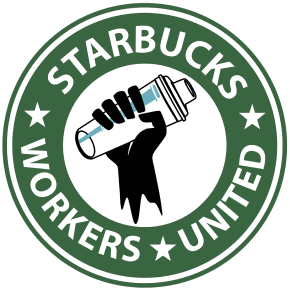All across the country, workers at Starbucks are organizing to build power in the workplace. They’re facing down brutal corporate opposition by preparing, educating, and helping each other, forging formidable solidarity in the process. Workers aren’t just looking out for their on-location partners — they’re collaborating across stores, cities, and regions in what has quickly become a nationwide movement.
In Boston’s Allston neighborhood, Kylah Clay, a 24-year-old barista and law student, decided to reach out to Workers United about unionizing her store last October. We spoke with Kylah as her store’s election was in-progress. When the ballots were counted, she and her coworkers had won their union in a unanimous vote.
We’ve organized our conversation with Kylah around some key topics and lightly edited for clarity. You can click on a subheading in the table of contents below to jump to that section.
Part One: Organizing The Store
I. Reaching Out To Workers United
KC: What really prompted this is Buffalo’s resilience.
I didn’t know a lot about unions at all. But with what I saw in Buffalo, I started listening. I started seeing all these things in the news about what was going on. And again, I didn’t know a lot about unions, but I did know that corporate was fighting this very hard, and at first I didn’t understand why.
When I realized the reason they’re fighting this is because it would give more power to the workers, I was immediately on board, and I was just really proud of what Buffalo was doing.
And frankly, I thought it was important that more stores joined them because you have to strike while the iron is hot. I knew it was hot: Buffalo was going, and they were not stopping. Mesa [Arizona] joined in. I felt, at that moment, that I needed to at least begin thinking about it more seriously.
So I emailed the Workers United folks, and I was very upfront. I said, I don’t really know a lot about unions, but I really want to learn and I really want to get started.
Maybe a few days later, we had a meeting with Richard [Bensinger of SBWU] and a bunch of folks from the Buffalo stores. They were still in that process of all the union busting and getting ready for their vote. And really the conversation was getting updates: what’s going on in Buffalo? Hearing it from them, as opposed to reading it in the news.
It gave me more insight into their experiences. And it was great because I could connect with them, you know, I work in this same place. I know that, in addition to all the union busting, they’re also still working their jobs, they’re still on the floor.
II. Organizing, Inoculating, and Filing
KC: After that initial meeting with Workers United, we started to ask partners, “Oh, have you heard what’s going on in Buffalo?”
If they were like, “Yeah, it’s crazy!” Then we knew, okay, this person is probably on board with what we’re thinking about doing.
If they were like, “No,” then, okay, we’re not going to talk to them about the union right now. With some folks, I would explain what was going on: we didn’t stop at “have you heard about Buffalo?” It was a series of a lot of conversations and build up, but we erred on the side of caution.
So, we got a couple more partners. That number grew from just [my co-organizer] Ash and me into about eight partners total. It took about a month to do that, to get to that eight-partner mark. When we were ready, we got cards out to all of the people in our organizing committee. We kept them in our apron pockets because they fit perfectly inside of them.
Buffalo would talk to our committee about all of the experiences they were having, and that allowed us to think about it and prepare for it: to see the strategies that corporate was employing, and the strategies that partners were employing to combat them.
We waited until Buffalo won their vote. Then we started handing out all of the union cards and getting them signed. And before we publicly announced our petition, we held a meeting with 18 to 20 employees from our store. They all came over to my apartment or met us on Zoom. And we just went through, first things first: what is a union? What questions do people have right off the bat? We discussed the process, the different stages of it. We talked about what to expect in regards to what was going on in Buffalo.
What was a possibility? What if corporate starts more strictly enforcing rules? First, knowing that that’s an unfair labor practice. We wanted people to know the law and know their rights.
Second, we wanted them to know what rules they could get in trouble for. So we had one of our shift managers go through all of the rules. That way we could all be alert and prepare.
We went public and after that, it was just kind of like, okay, we’re doing it now.
III. Charting and Assessing the Store
KC: When we started, we’d written down the names of all of our coworkers on the schedule. And the suggestion was to rank them on a scale of 1 to 5: how sure are you that they will vote yes? 1 being that you’re positive they’re going to vote no. And so we did that.
When it was just Ash and me, it was hard. We figured, there are conversations happening that we’re not a part of, so we can’t really gauge it, right?
When we had more committee members on board and we sat down and did it, it was way more effective. That’s the advice I give to partners now, too: get your committee together, and then start really sitting down and thinking, how likely is it that you’ll get the cards that you need?
Part Two: Fighting Union Busting
I. Combating Captive Audience Meetings
KC: I think there are a couple of steps to it, and it starts with the people who experience listening sessions and one-on-ones. That was Buffalo for us. For some of the stores in Boston, that’s us for them.
It’s really important for partners to record everything they can. We made a “corporate misinformation” Google form, a log for all of our partners to write down every conversation that they have with corporate people, so we could track misinformation, we could track unfair labor practices. [Update: We now work with the National Lawyers Guild to have volunteers take statements from partners in case a ULP occurred. The statements are sent to our union attorneys, who help follow up!]
I took as many notes as I could. My partners did the same. At the end of the listening sessions, we’d go into the parking lot and just talk about what they said.
And honestly, it was mainly us just being baffled at how ridiculous some of those statements were. But being so baffled and so shocked, you want to sit down, write what they said down, and then share this information with your partners, who may not have been sure about what the answers to those statements were.
We would scan those notes. Some of the partners would come over right after — I live across the street from Starbucks — and we would just scan their handwritten notes. I put them all in a folder. I sent that folder to our attorneys, and they have access to any information that might be helpful, at any time.
People will tell us the egregious things that they’re being told. That helps all of us, too, because if we know what’s being said at one of the nearby districts during their one-on-one meetings, then we can prepare our workers here.
Now, we have all of these resources. We had all of the things they gave to Buffalo. Then we made our own resources, too. We keep all of it. We share it with our partners.
It’s very helpful to have copies of the propaganda that they plan to hand out, and then sit down with them and prepare in advance. Because they will not back down: you need to feel incredibly solid and ready to push back.
II. Contending With Corporate Lies
KC: Corporate is really good at spewing facts, withholding context to examples, and framing information how they want to. And it can be very confusing.
Even for myself. I had done so much research, and I’m a law student, I felt very confident in the law. But I was being, I honestly think, gaslit by our regional vice president, Amy Tingler. Because she was telling me, no, that’s wrong. No, that’s wrong. So many times.
Even though I knew the law. She later, the next week, came back and apologized, and said she was wrong. But the thing is, if you don’t know the law and if you’re not confident, you won’t keep pushing.
Actually, during the first listening session, I had my documents out and was ready to take notes, and I was told by corporate that I was not allowed to. I gave them a hard time. But I wanted to pick my battles, and I knew I was going to be battling later that night.
So I dropped it. Then, quickly– they backtracked, and said, ‘we’re so sorry, you’re allowed to take notes.’ And so everyone else after that was able to.
It was a lot of vague threats of losing benefits. One of [the corporate anti-union leaflets] I have, it says, “Workers United will have control over you.” That was really their approach, to try to lie as much as they can or twist information to scare people.
And I think that the role Buffalo had for us was really preparing us, so we could get ahead of that. I think that’s been really, really important in the Massachusetts effort.
We’ve held employee rights trainings. We are creating a ULP training, to teach people how to spot unfair labor practices and file claims. [Update: We finished the ULP training and provide it on a national level for partners every week!] We have those inoculation meetings, where we don’t just discuss what’s going on or what the union is, but what your rights are, and how you can best prepare and fight when corporate tries to trample on those rights.
Right now, what people are being told is that if you unionize, you won’t be able to get raises. They’re saying that we won’t get the summer raise that all the other partners in our district will get. Which is incredibly illegal.
I’m so glad that my partners all know that. I’m so glad that they can point that out and say, that’s not allowed. I’m really glad that partners at the other stores we’ve helped can also do that.
III. Standing Up To Corporate
It’s very scary to stand up to corporate. I know that not every partner is going to feel comfortable doing that, and there’s no judgment, because it’s a very scary thing: they won’t back down. They will lie to you.
They will get themselves caught. And then, eventually, if you don’t give in… they will give in: because they are wrong.
So I think when partners speak out and hold corporate accountable, it is so important.
Just recently one of my co-organizers and I went to Starbucks to get coffee and do work for the union. And right next to us were the district manager, some random corporate person, and my manager.
I love my manager. But I knew why the district manager was there and what was happening. I think even just our mere presence is important. When we first filed, I would show up at my store with my Starbucks Workers United shirt on, and I would just hang out.
Like, if corporate’s going to surveil us, I’m going to surveil corporate. That’s important.
IV. Sharing Knowledge and Resources
KC: What we ended up doing was thinking, okay, what are we being told by corporate? And what are some questions people might have?
Whenever a new store files in Massachusetts, one of the first things I want to get to them is the Union Resources folder. We have a Google Drive, we call it our Union Resources Google Drive. I made it when my store first filed, and it was originally for my store: we save all of the resources we’ve gathered, and I was trying to make all these resources easily accessible for folks.
Then, we started sharing it. We filed in December, so that was back when it was just Mesa and Buffalo– as more stores started to unionize, we sent them the shared link so they could also see it.
And then, it became more of a collaborative Google Drive. So, there’s resources from Buffalo in there, from Arizona, from Boston, from Virginia.
It has an entire PowerPoint on what to expect from Starbucks. We have literature that breaks it all down. We have a script from one of the one-on-ones: we wrote down word-for-word what was being said. I think it was a store in Virginia that added that.
And it’s not just union or anti-union campaign stuff. Virginia made a really cool thing about how the community can get involved. Boston made a press prep packet, so partners who are going public know how to chat with people and don’t feel uncomfortable. The Buffalo folks made a social media branding guide.
Things like that are all available to our partners in a really easy way, and I think that’s helped a lot. It gives us all an opportunity to be really prepared and really connected.
Part Three: Union Busting Busted
I. Corporate’s Tactics
KC: I have a theory that it really boils down to what corporate assesses with the store. 85% of our partners signed cards within a couple of days, and that was reported on. I think corporate saw that, assessed, and chose to not expend their resources on my store.
I think that decision was solidified after that first listening session when [Starbucks VP] Amy Tingler came in and was not ready for it.
I promise you, we fought tooth and nail every single listening session, and we did not back down. I think that ultimately made them a little more afraid of our store. I’ll tell you, during our very first listening session, the look on Amy’s face was just priceless when she realized she was dealing with a group of vocal and knowledgeable people who are very passionate about the union.
I’ve talked to Richard Bensinger about it and he agrees– they’re afraid of us. The other store that filed at the same time, too, had minimal union-busting stuff happen, besides the obvious misinformation campaign. At one point, my district manager even said he’s intimidated by me. So I know that they’re afraid of us! I thought I was going to get fired on that phone call, but it took a turn.
One store in Boston that we helped file a couple weeks after us actually reached out to me a few months after they filed, and they said, ‘Kylah, Do you know if we correctly filed our petition? Because we haven’t heard anything from corporate.’ I think that shows you that they’re not going to come over and mess with us in this district. 6 out of 11 stores in our district filed.
But that doesn’t mean that they haven’t been retaliating against people. They definitely pick and choose. We got lucky because we do have such a unified front.
II. Corporate’s Targets
They’re doing it in stores that don’t look as strongly united. They’re going to choose places that are not surrounded by other unionizing locations.
I think they’re choosing their stores and also choosing their victims: who they retaliate against and try to intimidate. And frankly, I think that they go after younger folks.
I know that they went after a high schooler up in Buffalo, and they’re doing the same right now to somebody named Laila over in Arizona.
I helped two high school students unionize their store. They reached out wanting to unionize, they were really excited, and they did all the work to do it. And right after filing their petition, one of the workers, 17 years old, was written up. Then they mysteriously shredded that write-up document, telling her, ‘Oh, it was because we had some of the dates incorrect, and we just don’t want the wrong thing in your folder.’
Then they told her that they wouldn’t give her a leave of absence, which they typically are very willing to give to students. It’s been offered to me by my own manager, too, but they wouldn’t give it to her.
There’s a store over in Newtonville. One worker, Naomi, was being picked on in particular, I think because they’re young, because they probably seem like an easy target. They’re definitely not. They’re very smart. They’re very ready to fight.
III. Corporate’s Hubris
But corporate is making assumptions. They’re making targeted decisions on who they will retaliate against; they’ve assumed that we were not going to be prepared for this.
But they were very unprepared. Because they underestimated just how brilliant our partners are.
Because they don’t really know us. Because corporate, I think, has an idea of what the typical barista is like, or what their education or experience is like, whatever their assumptions are.
They’ve assumed that we were not going to be prepared. They’re still not ready for just how prepared partners are, because I don’t think they realize how interconnected we’ve been.
IV. Corporate’s Propaganda
KC: At one point, they gave us this flyer that had all this information that’s not accurate, and they frame it very weirdly; and, the way they made it look is almost like it came from the NLRB itself. Which is incredibly concerning.
One of the things they framed very weirdly — this is an FAQ:
“I’m concerned about the media headlines about the union petitions. Are these reports accurate?”
First of all, notice their language. “I’m concerned,” as if that’s a frequently asked question by partners. I can guarantee you that none of us were asking that question.
And then, the way they answer it is:
“We know you may be seeing confusing messages in the press. And we’re here to share the facts.”
I’m not really sure what confusing messages they’re seeing in the press, because the only things that are being reported in the press are when a petition is filed and what a partner is saying about it.
The way they formatted it, the first page had all the FAQs, and then if you flip it around, it had “additional information and resources” with a link to the NLRB website and a screenshot of their home page.
All of my partners at first thought it was them trying to say that the NLRB provided this to them.
We eventually deduced that wasn’t the case. But if you didn’t look into it, you would have believed it.
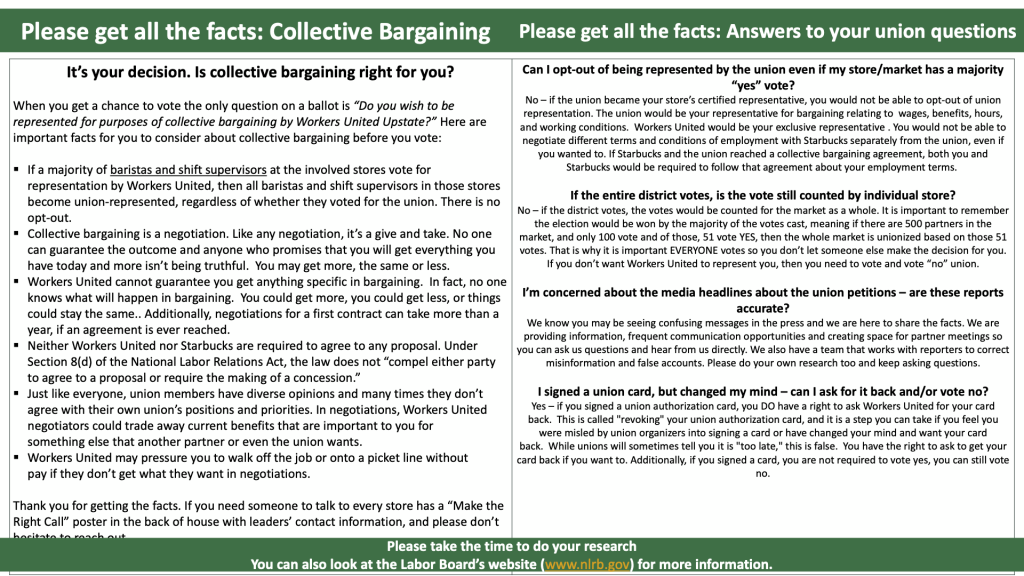
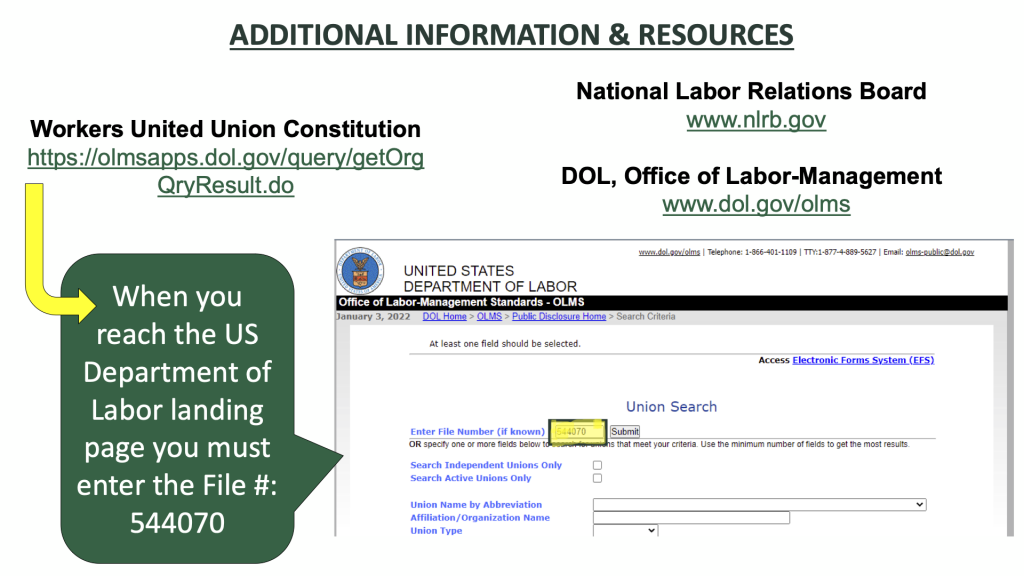
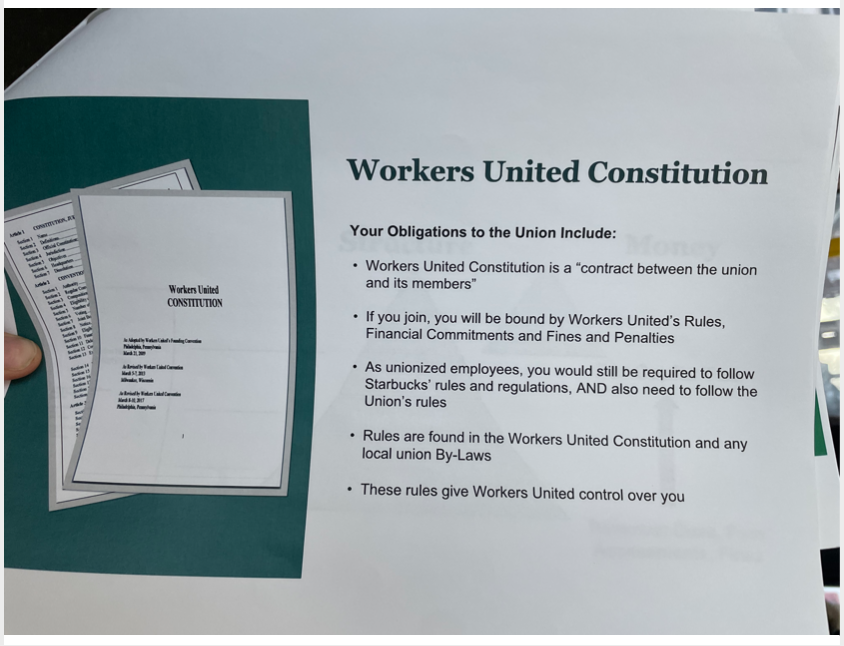
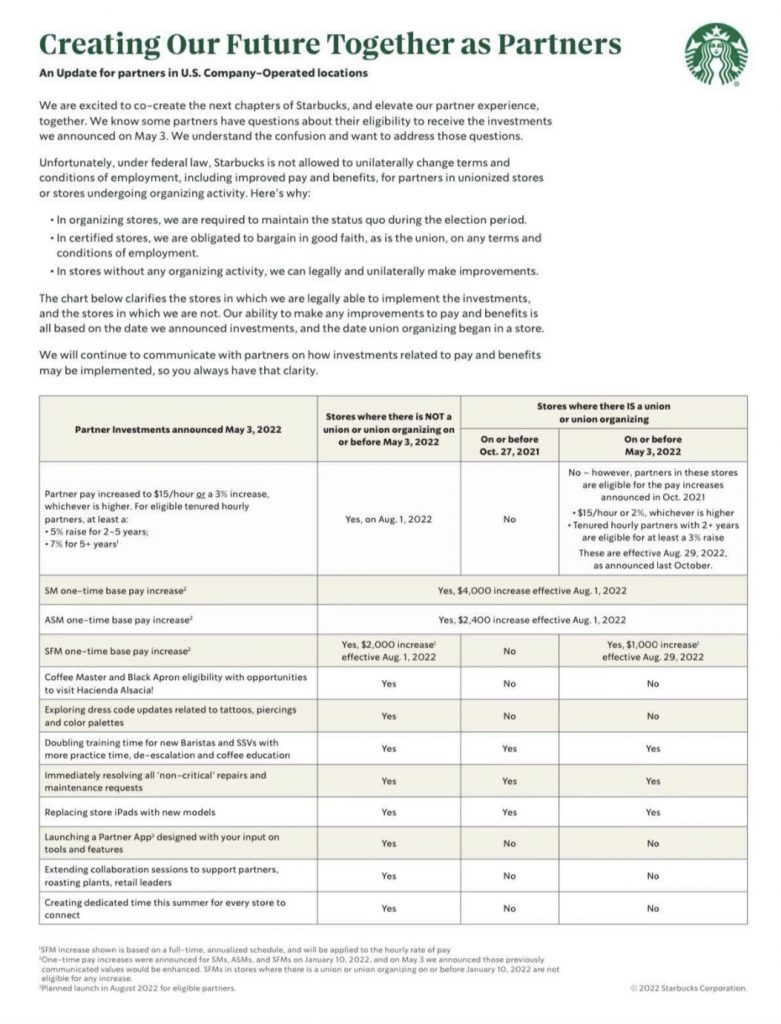
Part Four: A Movement
I. Regional Hubs
KC: When we first filed, it was just Buffalo, Mesa, and us.
I don’t have any social media, but my two co-organizers were getting a lot of DMs on Twitter or Instagram, people asking, ‘How do we file? How do we do the same thing?’ And I remember one night I was talking to [my co-organizer] Tyler about it and we were like, ‘Well, you know, we can help them out. Let’s figure it out.’
I focused on creating some type of a structure, or a foundation, so we could help other stores. So we could, like I said, strike while the iron is hot, move fast. We wanted to make it easier for those stores to move fast, because for us it was a process. We had to figure out how to do it.
More and more stores started filing, and I think people started to focus in on their regions: we were doing that in Boston, and I think it was happening in other places too.
It was quick. I made our Greater Boston email account two weeks after filing. As soon as we filed and started getting these messages, it was like– I think this will actually continue to pick up steam.
Because, imagine if we get that store to file: then another store will want to. It’s not just going to be these handful of people that just reached out to us. We want everybody in Boston to unionize. This is going to be, hopefully, a continuing domino effect. We said, well, wait a second, it’s not going to stop here; so that’s when we were like, okay, we need something to centralize this.
We just sat down and created an email account. That way we could transfer the Google drive that was in my account and put it into a shared one. We share the email account: myself, Ash, and Tyler, the three of us. [Update: the account is now shared with several other organizers throughout the region!]
The way we have divided it is by skillset and interest. Ash is in charge of social media. They help coordinate press interviews and respond to those types of emails. Tyler is in charge of outreach and events; together we planned a rally in solidarity with the Memphis Seven, and he planned an event at the Brooklyn Booksmith for a bunch of other coffee shop organizers.
And then I’m in charge of the petition support and unionizing process, helping other partners. It’s stuff that I genuinely like to do. I’m very administrative and task-oriented. So that kind of fell into place. There was a little bit of trial and error.
We created a Massachusetts Organizing Committee. We have two weekly meetings and we invite partners from all over Massachusetts to join us. That’s like our working group: where we talk about what’s coming up, what to expect, or what’s happening at people’s stores.
II. National Infrastructure
KC: While this is all happening, we’re trying to form a national component, too, a national structure. We’re still in the process.
One thing that we’re working on right now is the partner-to-partner organizer training. I do that on a biweekly basis. That’s so partners who have already unionized or petitioned, who have gone through that process, can help other stores file and learn the ropes of it, too.
And we’re working on, how can we build on that? We have different committees. We have a committee that’s in charge of communications: how do we communicate what’s going on to all of these different stores?
Something we do that I think is really cool is we have case studies: we have different regional hubs present how they do it in their area. Buffalo talks about how they help other stores. Seattle talks about how they help other stores. Eugene, Oregon gave a presentation on what their approach is. Boston gives their approach.
And they vary. It varies depending on how much support they have from Workers United, too: in Massachusetts, it’s minimal, and that’s purposeful, because we have a lot of resources in our partners already. [laughing] But, we also don’t have a Workers United New England Regional Board.
We do a lot of extra steps because of that, whereas some other places might have more Workers United support to take on administrative stuff, the stuff I do. We have the case studies to show people that it’s up to your region how you want to make it work.
We started talking more about the national structure: we are trying to get some national framework together. I actually just finished making this big org chart — after a lot of work and a lot of research with the people in Seattle — that I’m going to propose at our next meeting as a group.
There’s a lot of interconnectivity, and I think we’re in the process of forming a national structure, but we’re still not quite there. So the focus has been regional in the meantime.
Again, it’s partner-run. We want it to be partner-focused. We don’t want it to be Workers United reps who are doing all the work, doing all the onboarding. We really want to be a part of it, because I think that’s what is making everything so successful.
III. Closing Thoughts
KC: It’s been exciting watching it grow: watching us adjusting in the moment, figuring out what we need.
I think that’s also where communication is so important. Bringing it all the way back to those listening sessions: by communicating with each other– by talking about what’s going on and what we think our needs are– we all come together and figure out how to help each other. I think that is what is making us so strong in this effort.
I don’t think we all anticipated how big this would get. And so now we’re starting to think, how do we adjust to how big the movement is?
That’s kind of where we’re at. It’s, you know, a natural, grassroots movement. I don’t really know how to explain how it’s all coming together, but it is.
I talked to Ash about it. We just sat down together and we were like, did you ever think this was going to happen when we filed?
We didn’t understand how big of a deal it would be or how big of a movement it would be. We just kind of thought, ‘Yeah, let’s get our store in, and hopefully we can get some other stores in too.’
I don’t think we had any clue what was coming our way. It’s cool when you find yourself in a situation like that.
I’m really looking forward to our election results coming out, because I think it will say something about just how strongly united we are.
EWOC Note
Since we first spoke with Kylah in April, Starbucks has escalated its already expansive and punishing anti-union campaign.
Just in recent months, the company has fired dozens of union organizers, begun shuttering union stores, and brazenly denied nationwide pay and benefits increases to union and unionizing workers. Instead of respecting workers’ right to organize and joining them at the bargaining table, the company has imposed a calculated system of everyday intimidation and retaliation, designed to make its own workplaces intolerable to the workers who run them: slashed hours, forced transfers, constant and unfounded reprimands, withheld development conversations, denied advancement opportunities. The goal is very clear: crush workers. Ensure no union ever receives a contract.
Facing this ruthless lawbreaking, every day more partners are compelled to exercise their power by collectively withholding their labor, bringing business and profit-making to a halt. But against a company as large and determined as Starbucks, their solidarity and courage alone won’t be enough; as they bear the brunt of this struggle, they need support from their communities and their comrades everywhere– from you, me, us.
If you’re able, here are relief funds you can contribute to– doing so will allow workers to eat, make rent, and stand strong against the boss until the boss caves:
- Donate to the Starbucks Worker Fund. Beginning in the fall, a committee of SBWU members will disburse all funds to Starbucks partners
- On GoFundMe, donate to funds for SBWU Pacific Northwest, Philadelphia, Denver, Ithaca – College Ave., Chicago – Clark and Ridge and many other stores and individuals
- Donate to the Greater Boston Labor Council New Organizing Fund to support Kylah and her many comrades as they confront union busting by taking the fight to corporate and Howard Schultz.
And here are some ways to get actively involved, from Kylah:
- Sign up to adopt a local store and take the No Contract, No Coffee Pledge. This is a way to get looped into organizing near you and offer workers support according to your skills and availability
- Go to a “Sip-In”, or join strikers on the picket line: show that the community has workers’ backs, support the strike by offering a particular skill or resource, and help refuse deliveries and keep stores closed
Or, if you’re not able to join local organizing in those ways:
- Show workers support by ordering a coffee under the name “Union Yes!”
- Talk to non-union baristas about the union movement, without pressuring them
- If you have money in pension or mutual funds that may be invested in Starbucks, you can wield influence indirectly: call on fund management to threaten divestment and be prepared to divest if Starbucks refuses to cease union busting and bargain in good faith
Thank you so much to Kylah Clay and the thousands of Starbucks workers fighting back for power in their workplaces as we speak. Solidarity to you, and to all the workers of the world.


